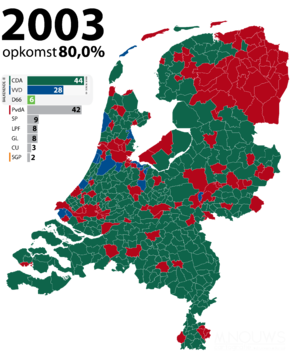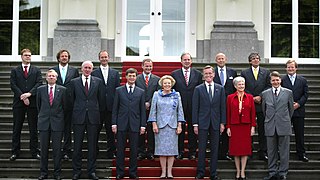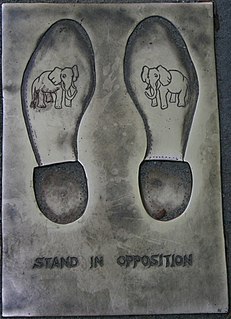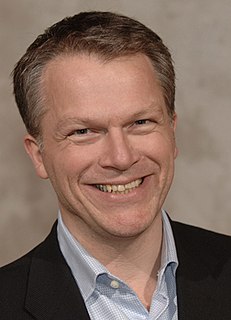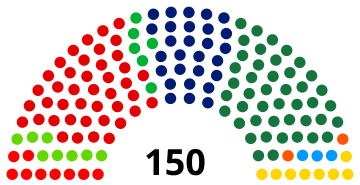
The People's Party for Freedom and Democracy is a conservative liberal political party in the Netherlands.
The Labour Party is a social democratic political party in the Netherlands.
The Pim Fortuyn List was a right-wing populist political party in the Netherlands. The eponymous founder of the party was Pim Fortuyn, a charismatic former university professor and political columnist who initially had planned to contest the 2002 general election as leader of the Livable Netherlands (LN) party. He was however dismissed as party leader in February 2002 due to controversial remarks he made in a newspaper interview on immigration-related issues, and instead founded LPF a few days later. After gaining support in opinion polls, Fortuyn was assassinated on 6 May 2002, nine days before the election. The party held onto its support, and went on to become the second-largest party in the election.

The politics of the Netherlands take place within the framework of a parliamentary representative democracy, a constitutional monarchy and a decentralised unitary state. The Netherlands is described as a consociational state. Dutch politics and governance are characterised by a common striving for broad consensus on important issues, within both of the political community and society as a whole.

The Christian Democratic Appeal is a Christian-democratic political party in the Netherlands. The CDA was originally formed in 1977 from a confederation of the Catholic People's Party, the Anti-Revolutionary Party and the Christian Historical Union, and has participated in all but three governments since then. Sybrand van Haersma Buma has been the Leader of the Christian Democratic Appeal since 18 May 2012.

Democrats 66 is a social-liberal political party in the Netherlands. Its name originates from the year in which it was founded.

The Second Balkenende cabinet was the cabinet of the Netherlands from 27 May 2003 until 7 July 2006. The cabinet was formed by the political parties Christian Democratic Appeal (CDA), People's Party for Freedom and Democracy (VVD) and the Democrats 66 (D66) after the election of 2003. The centre-right cabinet was a majority government in the House of Representatives.
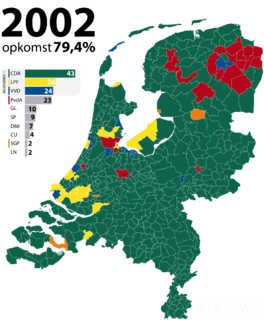
General elections were held in the Netherlands on 15 May 2002. The elections were amongst the most dramatic in Dutch history, not just in terms of the electoral results, as they were completely overshadowed by the assassination of leader Pim Fortuyn only nine days before election day.

General elections were held in the Netherlands on 22 November 2006 following the fall of the Second Balkenende cabinet. The elections proved relatively successful for the governing Christian Democratic Appeal (CDA) which remained the largest party with 41 seats, a loss of only three seats. The largest increase in seats was for the Socialist Party (SP), which went from nine to 25 seats. The main opposition party, the social-democratic Labour Party (PvdA) lost nine of its 42 seats, while the right-liberal People's Party for Freedom and Democracy (VVD) and the progressive liberal Democrats 66 lost a considerable portion of their seats, six of 28 and three of six, respectively. New parties, such as the right-wing Party for Freedom (PVV) of former VVD MP Geert Wilders and the animal rights party Party for the Animals (PvdD) were also successful, with the PVV winning nine seats and the PvdD winning two, thereby becoming the first animal rights group to enter a European parliament.

Mark Rutte is a Dutch politician serving as the 50th and current Prime Minister of the Netherlands since 2010 and Leader of the People's Party for Freedom and Democracy since 2006. Rutte was previously appointed as State Secretary for Social Affairs and Employment from 22 July 2002 to 17 June 2004 and as State Secretary for Education, Culture and Science from 17 June 2004 until 27 June 2006, when he was elected to succeed Jozias van Aartsen as the new VVD Leader.

The Third Balkenende cabinet was the cabinet of the Netherlands from 7 July 2006 until 22 February 2007. The cabinet was formed by the political parties Christian Democratic Appeal (CDA) and the People's Party for Freedom and Democracy (VVD) after the resignation of the Second Balkenende cabinet. The right-wing rump cabinet served as a caretaker government until the election of 2006.

Following the 2006 Dutch general election, held on November 22, a process of cabinet formation started, involving negotiations about which coalition partners to form a common programme of policy and to divide the posts in cabinet. On February 22, 2007 it resulted in the formation of the Fourth Balkenende cabinet.

The 2003 Dutch cabinet formation concerned the formation of a new cabinet after the Dutch general election, 2003 held on January 22, 2003. It involved negotiations about which coalition partners would form a common programme of policy and it involved the division of the cabinet posts. After severe disagreements in the formation of a CDA-PvdA cabinet, a CDA-VVD-D66 cabinet was formed on May 27, 2003, with Balkenende as prime minister.

Provincial elections were held in the Netherlands, on March 7, 2007. The election also determined the members of the Senate, since the 564 members of the twelve States-Provincial elect its 75 members. This election took place on May 29, 2007.

The Fourth Balkenende cabinet was the cabinet of the Netherlands from 22 February 2007 until 14 October 2010. The cabinet was formed by the political parties Christian Democratic Appeal (CDA), Labour Party (PvdA) and the Christian Union (CU) after the election of 2006. The grand coalition cabinet was a majority government in the House of Representatives.

General elections were held in the Netherlands on Wednesday, 9 June 2010. It was triggered by the fall of Prime Minister Jan Peter Balkenende's fourth cabinet on 20 February with Queen Beatrix accepting the resignation of the Labour Party ministers on 23 February. The conservative-liberal People's Party for Freedom and Democracy (VVD), led by Mark Rutte, won the largest number of seats in the House of Representatives while the social-democratic Labour Party (PvdA), led by Job Cohen, came a narrow second. It was also noted for the rise of the controversial politician Geert Wilders and the Party for Freedom (PVV), which came in third. On the other hand, the election was a poor result for Balkenende and his Christian Democratic Appeal (CDA), which lost half its seats and dropped from first to fourth place. The Socialist Party (SP) also lost seats. Notably, the 31 seats won by the VVD is the most in years, and the one-seat margin between the VVD and PvdA is the closest on record.

Early general elections were held in the Netherlands on 12 September 2012 after Prime Minister Mark Rutte handed in his government's resignation to Queen Beatrix on 23 April. The 150 seats of the House of Representatives of the Netherlands were contested using party-list proportional representation. The People's Party for Freedom and Democracy (VVD) received a plurality of the votes, followed by the Labour Party (PvdA).
